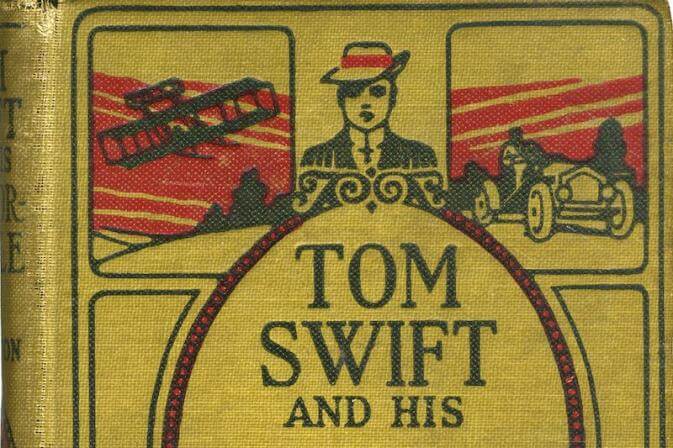Grammar Girl on the new words added to the OED…
New Words Added to the Oxford English Dictionary—Again!
The Oxford English Dictionary added new words again, and this update includes fun words such as “Tom Swifty.” Will “levidrome” be next?
By
Mignon Fogarty,

The headline for this article is something of a joke: New Words Added to the Oxford English Dictionary—Again! It’s a joke because I’m implying that it’s unusual for the dictionary to add new words, but the editors actually do it every quarter. But still I love reading the new words and thinking about them, and one of my all-time favorite Grammar Girl episodes is about how words get in the dictionary, so we’ll talk about them a bit today.
Why Do Dictionaries Add Words So Often?
Dictionaries add new words so often because people keep using new words. That’s the short version of how words get in the dictionary: if enough people use them, they get added. If you hear a word you don’t know or don’t understand, and you go to the dictionary to look it up, you want it to be there; so it makes sense for dictionaries to include words as they are used.
British Versus American Dictionaries
An interesting cultural difference that I learned about from Lynne Murphy, who has a great book coming out on the differences between American and British English called “The Prodigal Tongue,” is that Americans are much more likely than the British to view dictionaries as the authority on words, the language bible, so to speak, whereas British readers are more likely to view the dictionary as a book for word lovers.
Is ‘Levidrome’ the New ‘Fetch’?
Another recent news story also highlights how words get in the dictionary. A Canadian boy named Levi Budd came up with the word “levidrome” when he realized there wasn’t a name for a string of letters that spells one word forward and a different word backward, such as “god” and “dog” and “stressed” and “desserts.” They’re kind of like palindromes, but not exactly, so he tacked his name onto the front of the “drome” root and has been campaigning to get his new word listed in dictionaries. I think it’s a useful word, but the bottom line is that he has to get people to use it, and use it repeatedly over a significant period of time, like any other word before dictionaries will include it. As Regina in the movie “Mean Girls” proved, you can’t just make “fetch” happen.
I feel optimistic about “levidrome” though because it is so useful. When I was on vacation I played around with trying to make a game based on levidromes, but nothing I came up with seemed fun enough to actually make into a real game, but Levi’s father said in a news article that teachers are sending him pictures of students making levidrome lists the same way they might make palindrome or homophone lists. So that seems promising.
January 2018 New OED Words
So let’s get to some of the new words that just entered the OED. What words have people been using frequently enough and long enough to convince editors they should be in the dictionary?
“Mansplain” made the list. It’s a combination of the word “man” with the last part of “explain” and means “a man’s action of explaining something needlessly, overbearingly, or condescendingly, especially to women, in a manner thought to reveal a patronizing or chauvinistic attitude).” I see that a lot on Twitter. I think I’ve only started hearing people use “mansplain” in the last four or five years, but the Oxford English Dictionary pins its first use to a LiveJournal post from 2008.
“Hangry” is another new word that I’ve only heard in the last few years, but the OED dates back much farther, all the way back to 1956. It’s a combination of “hungry” and “angry” and to me it is at least as useful as “levidrome.” I mean, I get angry easily when I’m hungry. Who doesn’t?
“Ransomware” is the kind of new word we get because of new technology or, in this case, new technology-related crimes. Ransomware is software that causes some kind of problem, like blocking access to your data, and demands you pay a ransom to fix it. What’s interesting about this word is that it looks like people used it infrequently starting in the 1980s to describe something I think of more as freeware—software that gives you limited access to features free and a full set of features if you pay—but the OED didn’t add the word until this update because it’s now being used frequently to describe the more malicious type of software.
“Snowflake” is another new word or at least a new sense of the word. And what’s interesting to me is that I remember how this word has evolved. It’s been around since 1983, but back then it was a good thing. A snowflake was a special person in a good way. It played on the idea that every snowflake is unique and was used to describe how people, especially children, are all special, cherished, and unique. I distinctly remember President George W. Bush talking about “snowflake babies” who came from frozen embryos left over from in vitro fertilization.
But then people seemed to get annoyed by the idea. For example, in the 1996 book “Fight Club,” the men embrace the philosophy as part of their indoctrination that “You are not a beautiful and unique snowflake. You are the same decaying organic matter as everyone else.” In my mind, “snowflake” ended up falling into the same category as participation trophies.
And then, more recently, “snowflake” has become an insult, a description of someone who is “overly sensitive or easily offended.” And it’s been used often enough and long enough that the editors at the OED believe it needs to be in the dictionary.
The final one I’ll talk about is “Tom Swifty” because I’ve actually been meaning to write about Tom Swifties for a few years. These are a type of joke that goes back to a children’s book series with a main character named Tom Swift. These science-fiction and adventure novels, created by the same man responsible for the Bobbsey Twins, the Rover Boys, Nancy Drew, and the Hardy Boys, were known for their avoidance of the bare word “said.” Tom did not just “say” things. Instead he said enthusiastically, he said bravely, he said happily, he said morosely, and so on.
This led to word play—a type of pun—in which the adverb relates to what Tom was saying, as in the following:
“Welcome to my apartment,” Tom said flatly. (because “flat” is another name for an apartment)
“The thermostat must be broken,” Tom said hotly.
“Rover went to get the ball,” Tom said fetchingly.
“I’m being held captive,” Tom said guardedly.
The name “Tom Swifty” for this kind of joke dates back to 1963, and the OED finally felt it was time to give the name its due.
All in all, more than 1,100 new words were added in this dictionary update, and I’ll put a link to the whole list on the transcript of this podcast at the Quick and Dirty Tips website.
It’s interesting to watch spellcheckers try to catch up too. My spellchecker knows “mansplain” and “ransomware,” for example, but it doesn’t know “hangry.”
Mignon Fogarty is Grammar Girl and the founder of Quick and Dirty Tips. Check out her New York Times best-seller, “Grammar Girl’s Quick and Dirty Tips for Better Writing.”

